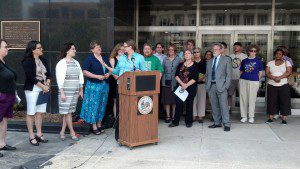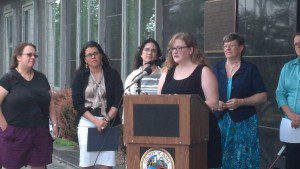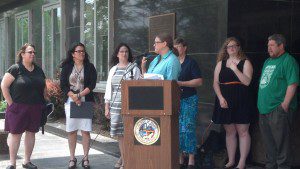I’ll give them credit, it’s a tough topic, much harder than approving a development or a new siren system. And there’s no easy fixes, but there are things you can do to at least not make things worse, and get good information to make good decisions.
County Commission to Tackle Poverty
Eleven-member Panel Will Continue Work of Task Force on PovertyCiting the need for a permanent effort to address poverty at the County level, Dane County Supervisor Heidi Wegleitner today announced the formation of the Dane County Poverty Commission, growing from the 2009 report of the county’s Task Force on Poverty.
“We can and must continue to support the human needs of those marginalized by poverty and growing inequality.” Wegleitner said. “But we also have to look at root causes. We need to prioritize equitable economic development and provide opportunities for persons of all income levels to live, work, and thrive in their community. We need to be taking care of people in poverty while simultaneously helping them climb out of it.”
The commission will consist of five to seven County Supervisors, the County Executive or a designee, and three to five citizen members.
The creation of the commission was a recommendation in the 2009 report of the County’s Task Force on Poverty. The Task Force made a number of other recommendations which are currently in various stages of implementation.
“The Task Force came up with some great ideas, but we can’t just let those ideas drift away,” said Supervisor Jennie Dye, who served on the Task Force and currently serves on the Human Services Board. “The Task Force was always going to be temporary. The commission is a permanent fixture in county government now. It just demonstrates the commitment our elected leaders have to solving these deep, difficult problems.”“Honestly, just having a permanent presence in county government is already a big step forward,” said Greta Hansen, Executive Director of Community Action Coalition of South Central Wisconsin. “The commission will do good work, I’m sure, but you don’t know how much it means just to have someone show they care. The fact that this commission now exists proves that the county government cares. That goes a long way toward giving people hope.”
Appointments to the commission will be made in the coming weeks and months, and the commission will begin its work in the fall
4 years after the Task Force Report on Poverty, they are moving forward with considering the recommendations.
1. Consider the impact on people in poverty before any decisions (finance, zoning, ordinances, resolutions and otherwise) are made by the Dane County Board
-Include low-income people as citizen appointees on committees – not just ones that concentrate on poverty issues
– Include “Impact on Dane County residents in poverty” sections to Policy Analysis Statements attached to County Board resolutions and staff reports for Zoning and Land Regulation Committee applications2. Restore proposed cuts to vital Human Services Programs throughout Dane County and resolve to maintain or increase the level of investment in services.
3. Make the Task Force on Poverty a permanent commission.
4. Collaborate with municipal and school leaders to maximize resources for households affected by poverty.
5. Ensure that future transportation plans include practical and affordable options for people in poverty to improve access to jobs and services.
6. Transportation planning for senior services must include access to no-cost food options for older adults, like community meals, pantries or farmer’s markets, Make a affordable transportation available for those who need it.
7. Support the expansion of community and pantry gardens to enable more people to grow their own food. Community gardens have proven to be an effective community development tool to strengthen communities while increasing access to locally grown food.
8. Dane County Leaders should use the Wisconsin Elder Economic Security Standard Index Report, July 2008, to evaluate current policies and consider developing and promoting equitable and rational public policies.
9. Adopt a self-sufficiency matrix to measure progress out of poverty. This matrix could be used by the public, private and non-profit sectors to track progress and make course corrections in programming and services.
Thanks to the County Board Supervisors who are willing to take this on! Supervisors Dye, Wegleitner, Pan, Krause, Sargent, Hendrick (and Hodthkiss?) all attended the press conference. They were joined by Alder Marsha Rummel from the City.










